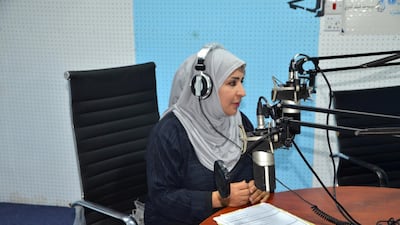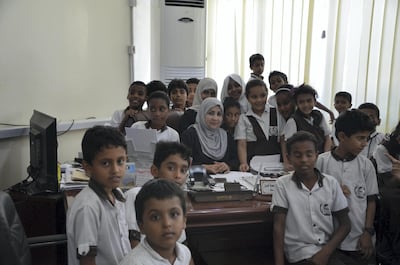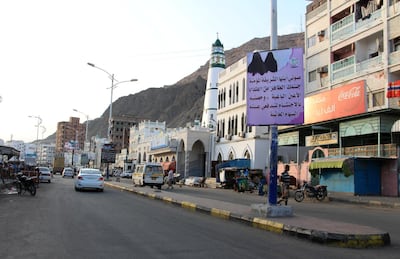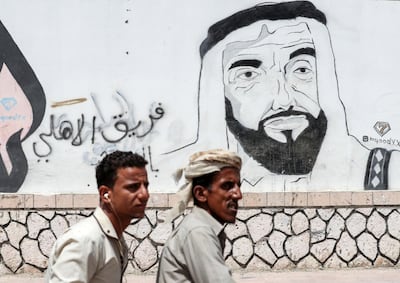At the headquarters of Mukalla Radio in Yemen, a few employees have been complaining about late salaries to their boss, director-general Afrah Mohammed Juma'a Khan, an elegant, ebullient woman. She asked them to sit down, told them not to worry and quickly made a few nervous phone calls. "When salaries do not arrive on time from Aden, I usually turn to the Governor [of Hadramout] Major Faraj Al Bahsani and ask him to give me a loan, and pledge to pay it back when the money arrives," Khan tells The National when we meet.
We're at her office in Mukallah, the capital of Yemen's south-eastern province, where this radio station was established in 1967. The people of Mukallah are working hard to rebuild their lives after Al Qaeda in the Arabian Peninsula (AQAP) captured the city in 2015, taking advantage of national disarray caused by Houthi advances. When AQAP was defeated in Mukallah a year later, aid poured in from the UAE to help rebuild the province.
Following her passion
Khan’s passion for her job is unwavering despite the many challenges that have presented themselves in the past few years. “I strongly believe in what I am doing and I passed those values on to my kids,” she says. In addition to her position as head of Mukalla Radio, she is also an actor, scriptwriter, anchor, activist, parent to three children and carer to her mother.
"I am too fond of holding the microphone," she says, smiling as pupils from a local primary school run in, surrounding her, posing for a picture. "I am known as an actress more than a radio presenter or a manager," she admits, explaining how she stars in almost all locally made dramas.
Khan says she owes her success to her open-minded mother and the support she received from her late husband. Her father was Mohammed Juma'a Khan, a well-known singer of local and regional fame, whose family hails from India. He was renowned for reinventing local songs in the early 1900s with his harmonious voice and Indian melodies. He died in his early sixties, when his daughter was only a toddler. Her brother Ibrahim also died when she was a child. Her grieving mother was left to pick up the pieces. "My mother was a simple lady," Khan says. "She loves me and she has never dictated to me." In order to survive, the family sold rattan craft products, while Khan sold juice to help her mother.
Creating her own life
When Khan turned 15, she wrote her first script for Mukalla Radio. Later, when she started working there, her boss, Fuad Bamatref, fell in love with her. When he asked Khan to marry him, she made it clear she would not cover her face and would continue to work as an anchor. "I realised that Fuad might change his mind after marriage and he might force me to stay at home," she recalls. "But he loved me and was extremely supportive."
Once married, the couple went to live in Russia, where Bamatref was studying. Khan began studying medicine, before she quit to start her career in journalism. Ten years ago, however, Bamatref died, leaving Khan to look after herself, their two daughters and a son, as well as her mother. "I was forced into paddling my own canoe to raise my children and I succeeded in giving them a better education," she says proudly.
Her eldest daughter recently graduated from a faculty of medicine and currently works at an international organisation in Mukallah. Her other daughter is still a college student, while her son is working his way through a secondary school for outstanding students.
Life under Al Qaeda
The rhythms of family life beat against the backdrop of conflict in Yemen. In April 2015, when AQAP seized control of Mukallah, much of the fighting took place around the central bank, which is close to the radio's headquarters. At one point, looters broke into the station's building, wreaking havoc, setting fires and stealing computers. The biggest loss was the thousands of recordings that had been kept in the radio's archives.
Khan lives close to the radio station. At the time of the attack, she tried to get to the station as she saw thick smoke billowing from the building. "My family locked the doors to prevent me from leaving," she says. When the dust settled, Khan sneaked into the building to see what damage had been done. "If we had the faintest idea that Al Qaeda was coming, we would have saved the radio," she says.
The days that followed were heartbreaking, she says. "I sent people to public auction sites and personally asked people to help me find them," she explains. In the end, she managed to recover three-quarters of the furniture and technology that were stolen, but still has no idea what happened to the archives.
A chance to rebuild
During the year that Mukallah was under AQAP's control, Khan kept a low profile but prepared plans to rebuild the radio when they left the city. "I had a strong feeling that, as they entered Mukallah quickly they would leave the same way," she says. Khan's prediction came true when the militants were pushed out of the city by UAE-backed Yemeni forces.
She didn't waste any time and quickly turned to the governor of Hadramout and Emirates Red Crescent and asked for their help to rebuild Mukalla Radio. "Look," she exclaims, pointing around the room at new tables and an air-conditioning unit. "This new office and other [facilities] were built from scratch by the Emirates Red Crescent. They gave us quality studios and furniture."
In recent years, dozens of women have taken charge of key positions across a number of Yemen’s employment sectors. They’re heading hospitals, media outlets, non-governmental organisations and have been enlisted in military and security services. Women’s rights advocates, including Khan, believe we still have a long way to go, however. “There are still many family and society-related obstacles that stand in the way of women’s integration,” she adds.




